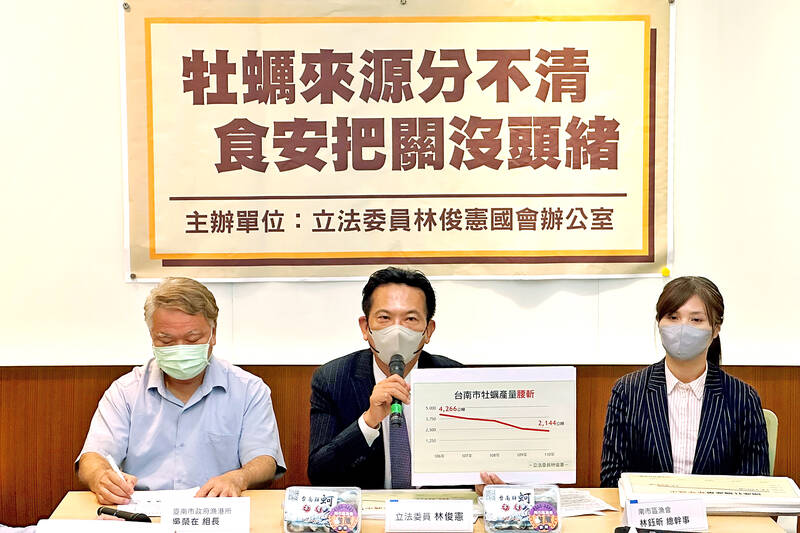The government should examine oysters imported from Vietnam batch by batch after an initial inspection found residual inorganic arsenic exceeding acceptable levels, Democratic Progressive Party (DPP) Legislator Lin Chun-hsien (林俊憲) said on Friday.
The Food and Drug Administration (FDA) said it has flagged Vietnamese oysters as a category 2 inspection item.
Inspections conducted in March found that at least two batches of oysters had more than five times the acceptable level of residual inorganic arsenic, Lin said.

Photo: Chen Cheng-yu, Taipei Times
Domestic sellers started importing Vietnamese oysters in about 2017, as they have a higher profit margin than Taiwanese-grown oysters, he said.
Imports of Vietnamese oysters have increased from 150 tonnes in 2017 to 3,000 tonnes last year, while domestic oyster production dropped from 23,000 tonnes to 18,000 tonnes, he said.
Imported oysters do not have origin labels, and the public would find it difficult to identify the source of oysters if the government does not identify them as a potential threat to Taiwan’s food safety, Lin said.
Chronic consumption of inorganic arsenic can lead to organ failure, and arsenic poisoning is a common cause of blackfoot disease, he said.
FDA North Area Management Center Deputy Director-General Lin Hsu-yang (林旭陽) said that Taiwan has three separate inspection stages: source management, border inspections and domestic inspections.
All imported goods must arrive with a certificate from health authorities in the area of origin, he said.
Border inspections have three levels: routine, more frequent and batch-by-batch inspections, he said.
Vietnamese oysters are now listed as requiring more frequent inspections, he said.
FDA South Area Management Center Deputy Director-General Tsai Chia-fen (蔡佳芬) said the Executive Yuan has convened a cross-agency task force to investigate the issue, adding that the team is reaching out to importers and domestic oyster farmers.
Inspections of 107 farms and importers from December 2021 to December last year has not shown any evidence that importers were attempting to pass off imported Vietnamese oysters as raised in Taiwan, she said.
The FDA would continue to work with business owners and importers to label their products correctly, she said.
Fisheries Research Institute aquaculture processing division head Tsai Hui-chun (蔡慧君) said that Taiwanese-grown oysters were the same species as those from Vietnam and it is difficult to tell them apart.
The institute has established a data archive that could help analyze the oysters, which could provide a basis for the task force to tell local and imported oysters apart, she said.

Several Chinese Nationalist Party (KMT) officials including Chairman Eric Chu (朱立倫) are to be summoned for questioning and then transferred to prosecutors for holding an illegal assembly in Taipei last night, the Taipei Police said today. Chu and two others hosted an illegal assembly and are to be requested to explain their actions, the Taipei City Police Department's Zhongzheng (中正) First Precinct said, referring to a protest held after Huang Lu Chin-ju (黃呂錦茹), KMT Taipei's chapter director, and several other KMT staffers were questioned for alleged signature forgery in recall petitions against Democratic Progressive Party (DPP) legislators. Taipei prosecutors had filed

Taiwan would welcome the return of Honduras as a diplomatic ally if its next president decides to make such a move, Minister of Foreign Affairs Lin Chia-lung (林佳龍) said yesterday. “Of course, we would welcome Honduras if they want to restore diplomatic ties with Taiwan after their elections,” Lin said at a meeting of the legislature’s Foreign Affairs and National Defense Committee, when asked to comment on statements made by two of the three Honduran presidential candidates during the presidential campaign in the Central American country. Taiwan is paying close attention to the region as a whole in the wake of a

President William Lai (賴清德) has appointed former vice president Chen Chien-jen (陳建仁) to attend the late Pope Francis’ funeral at the Vatican City on Saturday on his behalf, the Ministry of Foreign Affairs said today. The Holy See announced Francis’ funeral would take place on Saturday at 10am in St Peter’s Square. The ministry expressed condolences over Francis’ passing and said that Chen would represent Taiwan at the funeral and offer condolences in person. Taiwan and the Vatican have a long-standing and close diplomatic relationship, the ministry said. Both sides agreed to have Chen represent Taiwan at the funeral, given his Catholic identity and

Lawmakers from the Democratic Progressive Party (DPP) yesterday established a friendship group with their counterparts in Ukraine to promote parliamentary exchanges between the two countries. A ceremony in Taipei for the Taiwan-Ukraine Parliamentary Friendship Association, initiated by DPP Legislator Chen Kuan-ting (陳冠廷), was attended by lawmakers and officials, including Deputy Minister of Foreign Affairs Francois Wu (吳志中) and European Economic and Trade Office in Taiwan Director Lutz Gullner. The increasingly dire situation in Ukraine is a global concern, and Taiwan cannot turn its back when the latter is in need of help, as the two countries share many common values and interests,